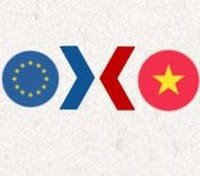(BRUSSELS) – The free trade and investment protection agreements between the EU and Vietnam, approved by an EU Parliament committee Tuesday, will remove virtually all tariffs between the two parties over ten years.
The agreement will protect emblematic European products, and allow Europe to access the Vietnamese public procurement market.
The agreement is also seen as an instrument to protect the environment and further social progress in Vietnam, including in labour rights, the resolution accompanying the consent decision states. The trade committee’s demands from Vietnam, including on labour and human rights, as well as on the mechanism ensuring the enforceability of the sustainability clauses, was adopted by 29 votes for, nine against.
The main elements of the trade deal are the following:
- removal of customs duties: 65% of EU exports to Vietnam will be immediately duty free, with the rest – including motorcycles, cars, pharmaceuticals, chemicals, wines, chicken and pork – gradually liberalised over ten years. 71% of Vietnamese exports to the EU will be duty free on day one, with the rest catching up in seven years. Duty-free Vietnamese exports of sensitive agricultural products, such as rice, garlic or eggs, will be limited;
- non-tariff barriers will be eliminated in the automotive sector, export and import licensing, and customs procedures. Vietnam accepted the “Made in EU” marking, beyond national markings of origin, for non-agricultural products;
- geographical indications: 169 emblematic EU products such as Parmigiano Reggiano cheese, Champagne, or Rioja wine, will enjoy protection in Vietnam, as will 39 Vietnamese products in the EU;
- services: EU companies will have improved access to business, environmental, postal and courier, banking, insurance and maritime transport services in Vietnam ;
- public procurement: EU firms will be able to bid for contracts with Vietnamese ministries, state-owned enterprises, as well as with Hanoi and Ho Chi Minh City;
- sustainable development: there are legally-binding rules on climate, labour and human rights. The agreement commits Vietnam to apply the Paris Agreement. Vietnam scheduled the ratification of two remaining bills on the abolition of forced labour and on freedom of association by 2020 and 2023, respectively. If there are human rights breaches, the trade deal can be suspended.
Separately, the trade committee also agreed by 26 votes for, seven against and six abstentions to an investment protection agreement providing an investment court system with independent judges to settle disputes between investors and state. The accompanying resolution passed by 27 votes for, seven against and five abstentions.
Parliament is set to vote on the trade deal and the investment protection agreement at its February session in Strasbourg. Once Council concludes the trade agreement, it can enter into force. For the investment protection agreement to enter into force, the member states first need to ratify it.
Vietnam is the EU’s second largest trading partner in the Association of Southeast Asian Nations (ASEAN) after Singapore, with trade in goods worth 47.6 billion a year and 3.6 billion when it comes to services. EU exports to the country grow by 5-7 percent annually, yet the EU’s trade deficit with Vietnam was 27 billion in 2018.
The main EU imports from Vietnam include telecommunications equipment, clothing and food products. The EU mainly exports goods such as machinery and transport equipment, chemicals and agricultural products to Vietnam.
Texts of EU-Vietnam free trade and investment protection agreements (European Commission)
EU-Vietnam trade and investment protection agreements page (European Commission)


